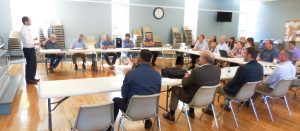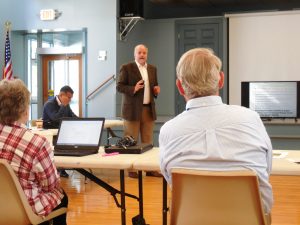HUNTINGTON – Selectmen and financial officers from the six Gateway hilltowns met on Saturday morning to consider opportunities for sharing accounting and assessor services. The workshop was sponsored by the Hilltown Collaborative, the state Division of Local Services (DLS) and Pioneer Valley Planning Commission (PVPC) as part of the Community Compact agreement signed by the six towns of Chester, Blandford, Huntington, Middlefield, Montgomery and Russell last year with the Baker-Polito Administration.
As part of the Community Compact, Zack Blake of the DLS met with the finance teams in all six towns, to see if sharing personnel, most of whom are part-time, would result in cost savings. Blake’s study found that using an outside service provider to support financial services in the town would bring some cost savings, and help prevent the difficulties that occur in small towns when key employees leave their positions.
When he presented his report in June, Blake had said one thing the team discovered was multiple people holding multiple jobs in the towns. “If they leave, how do we find bodies to fill the role(s),” Blake said, noting the difficulties in finding people at the salaries paid for very part-time jobs requiring high skills. He also spoke about the demographics of the communities, which he said were “aging in place,” with a shortage of young people, and the fact that some of the financial roles in the towns were elected, and some appointed. “The DLS has a longstanding bias of appointed financial services due to the sophistication required,” Blake said.
On Saturday, three companies providing financial services to multiple towns throughout Massachusetts introduced themselves. Robert Dean, director of regional services for the Franklin Regional Council of Governments presented their Town Accounting Program, which was started in 2005 to respond to the need of Franklin County communities for professional accounting services. Currently, the group serves 12 towns in Franklin County.
Dean said if the Gateway towns used their service, they would have a FRCOG staff member appointed as town accountant, who would be on site in the town hall one day or one half-day a week. He said the program runs like an Enterprise Fund, with all of the expenses contained in the budget. He said while the accountant may be present less often, the towns would have professionally qualified and trained staff along with back-up staff, and access to software through a shared license. He said the program would reduce human resource costs of hiring and retirement, and provide “peace of mind.”
Dean said some of the challenges they have faced include travel expenses that are passed onto the towns, as well as costs from attending staff meetings and budget development. “We have found if the budget is too tight, there is not enough time in the budget to cover sick time, vacation, travel, and the staff gets burned out.“ He added they try to keep increases under 2.5% per year. “As the future of this, the more you can do remotely, the less cost to the towns, the more I can attract talented staff who might not want to travel,” Dean said.
Blandford selectman William Levakis asked if the town would still have an accountant in place, and Dean responded that they wouldn’t need to have both. He said they would be contracting with the towns with a Select Board sign-off. “I’m working on the budget with the finance director, which is submitted to the Finance Committee, then goes to the full Council,” he said, adding that the service is based on the yearly assessment in the budget, and is billed quarterly.
Josh Garcia of Pioneer Valley Planning Commission then introduced Justin Cole of the Baystate Municipal Accounting Group to present another model in its Regional Financial Management program. Cole said his program is comprised of former municipal employees helping current municipal employees. He said the Baystate Municipal Accounting Group, which was established in 2009, has served 40 communities to date, at varying levels of assistance, but mostly by providing accountant services.
Cole said his employees do not spend a lot of time in town halls. “When we do come onsite, it’s to meet with you and management; anything other than transactions,” he said, adding that 95% of the transactions are done in the office. Staff is available by email, phone and website. “Because we don’t come to your town, we average between 20-25 hours per week with your municipality, and cut out driving time,” he said.
Cole said the billing is set up for the towns based on an annual amount, and they do track hours put in. “We don’t make a killing doing this. We’re in this to bring the service to market. Our focus is on smaller towns,” he said. He then described the dilemma in small towns, where positions are required by statute, and there are a lot of part-time jobs with people wearing 2 to 3 hats. He also commented on the difficulty in filling positions with skilled staff. “A service can be more affordable,” he said.
“I think there are other towns that are serious in exploring this. Chester is pushing to move this forward,” said Chester Select Board chair John Baldasaro. “It’s a window of opportunity, and the right climate to take advantage of this. Shared services are going to be a necessity to be cost effective,” he said.
After a short break, Harald Scheid of the Regional Resource Group presented a model for shared assessor services. Scheid said he has been an assessor for 45 years, and was the first regional assessor in Massachusetts. He said his group manages and staffs 23 assessors’ offices across the state, and provides service to 13 others. Locally his team serves six towns in Berkshire County, including Otis and Becket.
“It’s no secret to all of you, that finding qualified, experienced municipal finance professionals is a challenge,” Scheid said. He said historically, towns had Boards of Assessors, comprised of elected volunteers who wrote their own rules before the Department of Revenue began requiring stricter mandates in the 1980’s. He said currently there is a diminished role for Boards of Assessors, with more towns eliminating them altogether. “We’re finding fewer and fewer people willing to volunteer their time to serve any board,” he added.
Scheid also said there is more and more sharing of assessors, who are now typically working in more than one community. He said many of the towns they go into are suffering from a lack of continuity, “literally every 9-12 months.”
Scheid also repeated the challenges for his company of travel time to remote communities. He said they are building a local team in Western Massachusetts which would provide inspectional activity in the towns with “boots on the ground,” and front desk customer support through telepresence technologies that could provide 40 hours of customer service. He talked about his vision of having town hall kiosks, with the ability to interact with live human beings, in addition to interaction through iphones and home computers. Scheid also said his GIS programs could also help analyze developable land in towns more accurately.
Scheid said the savings come from taking mileage and training out of town budgets.
Following the presentations, Garcia said there is a lot for the towns to think about, and a lot of complexities, such as appointed vs. elected positions. “To let you know, there are state resources available to allow you to navigate around that. The Community Compact program is an umbrella for other pots of money,” Garcia said. Some of the other “pots” he cited were the Best Practice Resource Program which can provide a feasibility component to look at how to move forward, and Efficiencies of Regionalization Funds, which help with implementation and startup costs.
Blake said the DLS can also serve as a liaison to navigate the process, with up to $200,000 potentially available to help the towns. He said while the grants are competitive, the hilltowns will get bonus points for the work they have done to date in exploring best practices and encouraging shared services. “This is something the administration is invested in,” Blake said. He also said the deadline for both grants is coming up in October and November. “The sooner the Hilltown Collaborative can come up with the application, the better,” he said.



